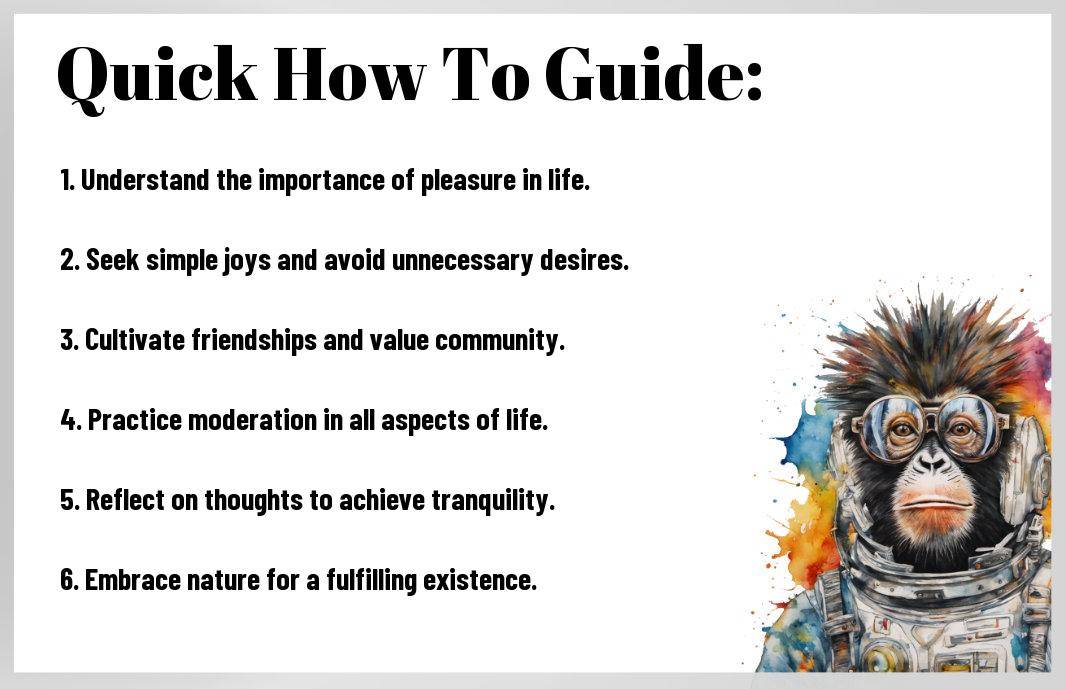
Newsletter Subscribe
Enter your email address below and subscribe to our newsletter

Enter your email address below and subscribe to our newsletter

Most of us seek happiness and fulfillment in our daily lives, but understanding how to achieve that can be challenging. In this beginner guide, I’m excited to share some insights inspired by Epicurus, the ancient philosopher who believed that pleasure is the key to a good life. Together, we’ll explore his fundamental ideas and simple practices that can help you shift your perspective and foster a more contented existence. So, let’s dive in and see how we can start thinking like Epicurus today!

On the surface, Epicurus might seem like just another ancient Greek philosopher, but he was so much more. Born in 341 BCE on the island of Samos, he founded a school of thought that centered around the pursuit of happiness and the understanding of pleasure. While many philosophers focused on grand abstractions, Epicurus was all about the practicalities of daily life and how we can find joy in it. I find it fascinating that despite the immense pressures of his time, he emphasized a simple, thoughtful approach to existence.
Even though Epicurus lived over two thousand years ago, the principles of Epicureanism remain incredibly relevant today. He taught that the highest good is to seek pleasure and avoid pain, but he also understood that this does not mean indulging in every whim. Instead, true pleasure comes from cultivating meaningful relationships, appreciating life’s simple joys, and understanding the natural world. It really strikes me that Epicurus encouraged us to determine what brings us genuine happiness rather than just following societal norms or chasing after fleeting pleasures.
To embrace Epicurus’ philosophies, I look at the essence of what constitutes happiness. It’s not just about physical pleasures or material wealth; it’s about mental tranquility and a fulfilling emotional life. By focusing on experiences that nourish my well-being—like spending time with loved ones or enjoying nature—I can find a sense of peace that aligns with Epicurean values. It’s all about making mindful choices that enhance my happiness and create a balanced life.

Now, as I investigate deeper into Epicurus’s philosophies, I realize that embracing pleasure isn’t just about indulgence; it’s about understanding the different types of pleasures that enhance our lives. Epicurus advocated for a diverse appreciation of pleasures, which can be categorized into various types. Each offers its unique benefits, encouraging us to find balance and fulfillment in our experiences. In this journey of exploration, I encourage you to reflect on how these pleasures shape your life:
| Type of Pleasure | Description |
|---|---|
| Physical Pleasures | These are sensory joys such as good food, soft fabrics, or a delightful fragrance. |
| Emotional Pleasures | These involve positive feelings like love, friendship, and laughter. |
| Intellectual Pleasures | Exploration of arts, literature, and engaging discussions stimulate the mind. |
| Spiritual Pleasures | These can include moments of tranquility, gratitude, and connection to nature. |
| Social Pleasures | These arise from community and shared experiences with others. |
There’s something truly magical about finding joy in the simple things around me. Epicurus emphasized that such pleasures are often the most profound and fulfilling. Whether it’s relishing a cup of coffee in the morning sunlight or enjoying the sound of laughter with friends, it’s easy to overlook these small joys in pursuit of larger goals. Yet, these tiny moments can create a rich tapestry of happiness in our daily lives if we take the time to appreciate them.
Plus, I find that consciously celebrating these simple pleasures often leads to a more satisfying life overall. Embracing the tranquility of nature, the comfort of a good book, or the delight of a home-cooked meal can foster a sense of peace and contentment. It’s remarkable how such straightforward experiences can bring about immense joy, inviting me to live more mindfully and appreciating each moment as it comes. The essence of enjoying the little things encourages us to seek fulfillment in our everyday lives while nurturing a genuine sense of happiness. So, go ahead and practice the art of savoring what’s right in front of you!
Once again, the philosophy of Epicurus provides valuable insights into how we can effectively manage pain and distress in our lives. He emphasized that understanding and managing our suffering is vital for achieving tranquility. Epicurus taught that while pain is an inevitable part of existence, we have the capacity to minimize its impact through thoughtful reflection and practical strategies. By focusing on what we can control, we can navigate our experiences more gracefully and live a more fulfilling life.
You might feel overwhelmed with the various forms of pain and distress in your life, whether they stem from physical discomfort, emotional turmoil, or existential concerns. The first step to alleviating this burden is to identify what specifically causes your suffering. Take a moment to reflect on your daily experiences and jot down moments that trigger feelings of pain or distress. By pinpointing these sources, I find that it becomes easier not only to address them but also to understand the underlying reasons for their presence in my life.
On my journey towards embracing Epicurean teachings, I’ve discovered several techniques that have helped me reduce suffering and find solace amid challenges. One effective method is the practice of mindfulness, which allows me to stay present and observe my thoughts and feelings without judgment. Additionally, focusing on cultivating friendships and strong social connections can provide comfort and support during difficult times. By nurturing a sense of community, I can ease anxiety and experience joy in shared moments.
The techniques I’ve implemented serve as practical tools I can rely on whenever I face pain and distress. For instance, adopting simple breathing exercises throughout my day helps ground me, while journaling helps me process my emotions more effectively. Furthermore, I often make time to engage with nature or practice gratitude, shifting my focus toward the positive aspects of my life. With these strategies in place, I feel more equipped to handle life’s inevitable challenges in a way that is inspired by the wisdom of Epicurus.
After submerging into the ideas of Epicurus, I realized that building meaningful relationships is not just about socializing; it’s about cultivating true friendships that enhance our lives. Epicurus believed that the highest pleasure comes from the bonds we form with others, and this led me to explore what genuine connections look like in everyday life. When I think about my own friendships, I see them as the cornerstone of my happiness, providing support, laughter, and shared experiences that make life worthwhile.
To appreciate friendship in the Epicurean sense, I find it helpful to focus on quality over quantity. Having a few close friends who understand me deeply can be more fulfilling than a large circle of acquaintances. These are the people with whom I can share my thoughts openly, who inspire me, and who walk alongside me in both good times and challenges. Epicurus emphasized that living surrounded by genuine companions brings tranquility and joy, so I make an active effort to strengthen these bonds in my life.
With each friendship I hold dear, I recognize the importance of nurturing those connections continuously. Just like a garden needs care, relationships flourish with attention and effort. I often find that a simple text or a call to check in can make a world of difference for someone I care about. This is how I keep the lines of communication open and make my friends feel valued. When we reach out, we reaffirm our commitment to each other, which leads to deeper understanding and trust.
With nurturing in mind, I also focus on being present during our interactions, making an effort to truly listen and engage. Whether it’s sharing laughter over coffee or supporting each other through tough times, I notice that each moment enhances my connections. I aim to create a space where honesty and vulnerability thrive, leading to more meaningful exchanges. By investing time and intentionality into my relationships, I feel the warm glow of friendship, contributing to my overall happiness, just as Epicurus would have advocated.
To truly embrace the teachings of Epicurus, I find that cultivating a peaceful mind is imperative for achieving happiness. This tranquility allows us to enjoy life’s simple pleasures without the chaos of a racing mind. By focusing on the present moment and fostering a sense of contentment, I can better appreciate what I have and let go of what doesn’t serve me. This is where mindfulness practices come in; they lay the foundation for a calm and fulfilling life.
If you’ve ever felt overwhelmed by thoughts or emotions, incorporating mindfulness practices into your daily routine can be transformative. I enjoy activities like meditation, which allows me to ground myself and cultivate awareness of my thoughts without judgment. Breathing exercises can also help center me, bringing my attention back to the present and away from distractions. By setting aside just a few minutes each day to practice mindfulness, you can begin to nurture a peaceful mind that resonates with Epicurus’ philosophy.
Assuming you’ve experienced fear or anxiety in your life, letting go of these feelings is an important step toward tranquility. I often find that fear can be paralyzing, preventing me from appreciating the joys around me. By acknowledging those fears and understanding that they don’t have to control my life, I can learn to embrace a more liberated mindset. It’s about shifting my focus from what might go wrong to what can go right, freeing myself from the limits that fear can impose.
With this process of letting go, I’ve been able to create room in my life for positivity and joy. Embracing vulnerability is part of the journey, and it’s okay to acknowledge my fears while also taking small steps to break free from them. I find that each time I confront a fear, I become a little lighter, a little more connected to the world around me, and a lot closer to the peaceful existence that Epicurus encourages us to strive for.

Unlike many philosophies that can feel distant or theoretical, Epicurus offers practical guidance that I find immensely valuable in everyday life. By embracing his teachings, I can simplify my approach to happiness and well-being. Here are a few actionable tips I like to incorporate:
This way, I can cultivate a life rich in happiness and tranquility.
For me, incorporating Epicurean principles is about finding balance. I try to live intentionally, making choices that align with my values and genuinely contribute to my happiness. I seek to understand my desires—distinguishing between what I want and what I truly need—this helps me avoid unnecessary stress and dissatisfaction.
Additionally, I focus on building meaningful connections. Epicurus emphasized the importance of friendship, and I believe that nurturing my relationships not only brings joy but also offers support during challenging times. Finding the right people to share my life with enhances my overall experience, allowing me to appreciate the simple moments together.
Assuming I have an understanding of my desires, I find that life’s choices become more manageable. When I am clear about what truly brings me joy, selecting options that align with those values feels natural and effortless. I often ask myself if a choice will enhance my happiness or fulfill a superficial expectation set by others.
Life can often present a multitude of choices that may seem daunting. By applying Epicurus’s principles, I can simplify this process by considering what brings me lasting pleasure versus momentary satisfaction. Whether it’s the decision to spend time with certain people or choosing how to unwind after a long day, clarity around my values allows me to pursue paths that are genuinely fulfilling. This approach not only helps me navigate choices with confidence but also aligns my day-to-day decisions with a philosophy rooted in the pursuit of happiness.
With these considerations in mind, I genuinely believe that embracing the philosophy of Epicurus can be a transformative experience for you. By prioritizing simple pleasures, cultivating meaningful friendships, and practicing mindfulness, you can enhance your overall happiness and satisfaction in life. It’s all about shifting your focus towards what truly matters and letting go of societal pressures that often lead us away from genuine contentment.
If you’re interested in delving deeper into Epicurus’ teachings, I highly recommend checking out the Best Way to Introduce Teachings? – FAQ – Epicureanfriends.com. This resource can help you explore various aspects of Epicurean philosophy further and guide you on your journey toward a more fulfilling life. The beauty of thinking like Epicurus is that it’s a personal journey, and I encourage you to let your own experiences shape how you embrace this ancient wisdom. Happy exploring!
A: Epicurus’ philosophy centers around the pursuit of happiness through the cultivation of pleasure and the avoidance of pain. He believed that the greatest pleasures come from simple, modest living, strong friendships, and the appreciation of life’s natural joys, rather than seeking material wealth or indulgence.
A: To adopt Epicurean thinking, begin by simplifying your life and focusing on what truly brings you joy. Reflect on your desires and distinguish between natural and vain desires. Cultivate relationships with friends, enjoy nature, and practice mindfulness to appreciate the present moment.
A: Epicurus classified desires into three categories: natural and necessary (such as food and shelter), natural but unnecessary (like luxurious foods), and vain (like fame and power). He emphasized that fulfilling natural and necessary desires leads to a fulfilling life, while vain desires can lead to disappointment and suffering.
A: Epicurus believed that pleasure is the highest good and that the absence of pain (aponia) is crucial for achieving happiness. He encouraged individuals to seek activities that maximize pleasure and minimize pain, understanding that true pleasure often comes from moderation rather than excess.
A: Friendship is considered one of the most significant sources of pleasure in Epicurean thought. Epicurus taught that strong relationships provide emotional support, joy, and comfort, leading to a happier life. He believed that friendships enhance our ability to enjoy life and navigate its challenges.
A: Start by evaluating your daily activities and identifying what brings you genuine pleasure. Engage in relaxing hobbies, spend time with loved ones, and practice mindfulness. Create an environment that promotes simplicity and contentment, focusing on experiences rather than material possessions.
A: To align with Epicurean principles, try to avoid unnecessary desires, anxiety about the future, and the pursuit of fame or wealth. Strive to avoid excessive worry about societal pressures and focus instead on cultivating inner peace, sustainable happiness, and meaningful connections with others.